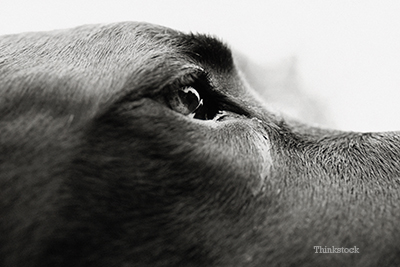
For more from Dr. Ernie Ward, find him on Facebook or at www.drernieward.com.
A rescued Great Dane with cancer may hold the key to a new treatment for humans. Star, the beloved best friend of famed Colorado University Cancer Center neurosurgeon Dr. Michael Graner, was 12 when she was diagnosed with a particularly aggressive form of lung cancer known as advanced bronchoalveolar adenocarcinoma. Most dogs live only 6 to 27 days after diagnosis. At age 12, Star was too old and debilitated to undergo chemotherapy or radiation. Even with the latest chemotherapy protocol, Star would only have a 10 to 15 percent chance of successful treatment. That’s when Dr. Graner decided to try something different.
Working with veterinary researcher Dr. Laura Epple, Graner and his team took cells from Star’s tumors, created a special vaccine to teach the body to fight the cancer, and administered it to Star. Graner and Epple knew the vaccine wouldn’t hurt Star and maybe, just maybe, could help an otherwise helpless pet.
Graner and Epple knew the vaccine wouldn’t hurt Star and maybe, just maybe, could help an otherwise helpless pet.
Both doctors realistically expected Star to develop full-blown metastases and decline within days. After all, this was a serious and advanced form of lung cancer. The first week after treatment passed with no worsening of her condition. In fact, Star began to show subtle signs of improvement. Another week, then another passed without incident. Graner noted Star’s quality of life was his highest priority. While Star was no youngster, her quality of life remained good after the experimental cancer vaccine treatment. One month lapsed and still no indication that Star’s cancer was worsening. The vaccine treatment seemed to be working. Finally, 44 weeks later Star began showing signs of the lung cancer’s return and spread. Almost one year from her cancer diagnosis, Star ‘s family made the difficult decision to euthanize her. Star ultimately enjoyed a good quality of life for more than ten times current chemotherapy expectations. Color me impressed.
Star’s case has been published in a medical research journal with the hope her story will inspire additional investigation. Graner is using his experience treating Star’s lung cancer in the fight against one of his biggest enemies as a neurosurgeon, the brain cancer glioblastoma. He hopes to find a way to create a vaccine treatment for humans faced with this devastating brain disease. The goal is to coax the body’s natural immune system into destroying cancer cells, leaving healthy cells untouched and with little, if any, side effects. Graner and his team believe this is a real possibility and Star’s case may aid in getting approval from the FDA for human studies.
Cancer sucks. Pets such as Star are helping both dogs and humans in the fight against one of the most common causes of death. As a veterinarian, I’m inspired by the actions of devoted pet parents such as Dr. Michael Graner. His compassion and unwillingness to accept Star’s prognosis has led to a significant scientific breakthrough that may illuminate future cancer treatments. Star lives on in Dr. Graner’s heart and in our medical destiny. Thank you, Star. You will be missed but never forgotten.
If you have any questions or concerns, you should always visit or call your veterinarian – they are your best resource to ensure the health and well-being of your pets.
